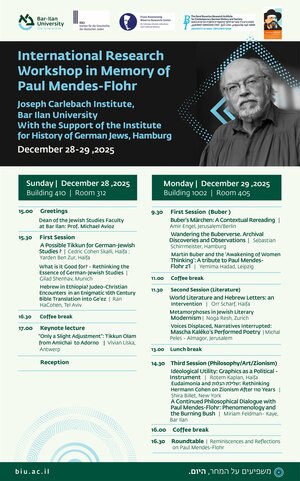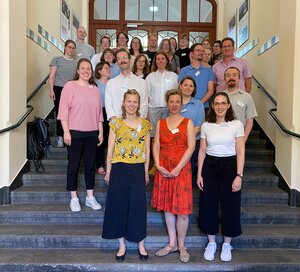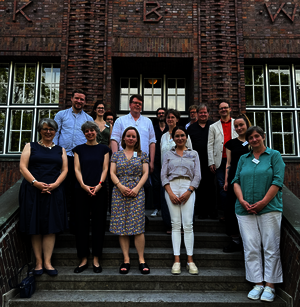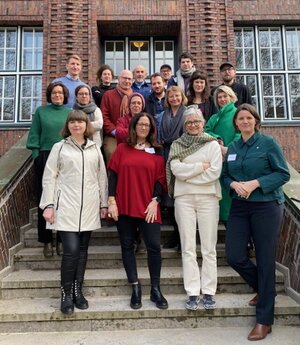Academic conferences organized or co-organized by the IGdJ bring together researchers from different levels of qualification and disciplines for international exchange.

International Research Workshop in Memory of Paul Mendes-Flohr
28. – 29. Dezember 2025
From 28 to 29 December 2025, an international workshop was held at the Joseph Carlebach Institute of Bar Ilan University in Ramat Gan, Israel, in memory of Paul Mendes-Flohr, one of the most influential researchers in the field of modern German-Jewish history, who passed away a year ago. The workshop was held in cooperation with the IGdJ and the Joseph Carlebach Working Group at Universität Hamburg. Other participants included the Franz Rosenzweig Minerva Research Center in Jerusalem and the Bucerius Institute at the University of Haifa.
The idea behind the workshop was to further develop topics that interested Mendes-Flohr, ranging from the future of German-Jewish Studies and the thinking of Martin Buber to a broad historical and cultural understanding of Zionism. The conference began with a session on new perspectives in research on German Jewry in modern times. Professor Cedric Cohen Skalli (Haifa) emphasised the need to view developments in Europe in connection with those in the ‘Orient’. Dr Gilad Shenhav (Munich) argued that German-Jewish Studies should not be taken for granted, but that their usefulness should be specifically questioned. The day ended with an exciting keynote lecture by Professor Vivian Liska (Antwerp), who traced the interpretation of the Talmudic concept of Tikkun Olam in the work of various Jewish thinkers of the 20th century.
On the second day, there were three sessions in total, the first of which was devoted entirely to the philosophy of Martin Buber. Professor Amir Engel (Berlin) spoke about Buber's fairy tales, Dr Sebastian Schirrmeister (Hamburg) presented the Buber Archive, and Professor Yemima Hadad (Leipzig) devoted her lecture to the phenomenon of ‘female thinking’ in Buber's work. The second session dealt with problems in literary studies – in lectures by Michal Peles-Almagor (Jerusalem) on Masha Kaléko, Noga Resh (Zurich) on ‘vermin’ in Jewish literature, and Orr Scharf (Haifa) on the contribution of Hebrew to the concept of world literature. The final session focused primarily on philosophy. Shira Billet (New York) attempted to reclassify Hermann Cohen's relationship to Zionism, Miriam Feldman-Kaye (Bar Ilan) continued her abruptly interrupted dialogue with Mendes-Flohr on phenomenology, and Rotem Kaplan (Haifa) spoke about how early Zionism was expressed in Israeli commercial art.
The concuding panel was devoted primarily to personal memories of Paul Mendes-Flohr, who was a mentor and personal friend to many of those present. Professor Lawrence Kaplan (Montreal) gave a short lecture on the relationship between Rabbi Joseph Dov Soloveitchik. All in all, this workshop was a lively expression of the Carlebach Institute's reawakened international relations, but above all it was a place where a wide variety of topics were discussed by researchers at all stages of their careers, who were in complete agreement in their high regard for the works of Paul Mendes-Flohr.

Report Workshop 1 July 2025
On July 1, a full-day workshop titled “Digital Holocaust Memory and Research – die großen Unbekannten von der Bereitstellung bis zur Nutzung“ took place at the Insititute for History of German Jews (IGdJ).
In five presentations, the speakers highlighted key aspects of digital history and digital outreach. The morning session focused on the theme “Sources as Data: Invisible Decisions – Unknown Use cases”. Key topics were the challenges of automatic text analysis (Helena Geibel, IGdJ) and the (re)production of historical experience in the digital space (Esther Rachow, Hebrew University of Jerusalem). In addition, the often neglected perspective on the target groups and users of digital formats were addressed and discussed (Tobias Ebbrecht-Hartmann, Hebrew University of Jerusalem).
After a lunch break, the second block began with the focus on “Digital Holocaust outreach tools. New formats – new questions” and concentrated on specific digital Holocaust remembrances projects. Ernst Hüttl (LMU Munich) presented the initiative “Learning with digital Testimonies (LEDIZ)”, while Nicole Mattern (Kinder vom Bullenhuser Damm e.V.) introduced the serious game “Remembering: The Children of Bullenhuser Damm” for interactive history education.
After each presentation, there was room for an in-depth exchange, in which the topics were reflected and questions were discussed together with the plenum and the speakers. In the final discussion, the moderators Helena Geibel, Anna Menny (IGdJ) and Esther Rachow (Hebrew University Jerusalem) summarized the key results and topics of the workshop. They identified the reciprocal interaction of analog and digital methods and spaces, the teaching of skills (data literacy, digital source criticism, media criticism) both on the part of researchers and producers as well as user., Framework conditions and resource issues which often stand in the way of sustainability and longevity were also named as well as participation, co-curation and (interdisciplinary) collaboration as central themes for digital research and outreach. They particularly emphasized the need for critical reflection, combined with transparent disclosure of the selection and decision-making processes. Especially with regard to increasingly data driven research or digital outreach, the aim is to make gaps and ambiguities visible. Particularly for these latter aspects, which affect the entire discipline, digital Jewish history seems to offer an opportunity, as it opens up new spaces for reflection and discussion.
The programme can be found here.
Photo: IGdJ
![[Translate to English:] Die Teilnehmenden der Konferenz „Revisiting Jewish Feminism“ im Jüdischen Museum Frankfurt. Foto: Rafael Herlich](/fileadmin/_processed_/4/4/csm_2024-11-18_20-02-42_486c1d3437.jpg)
International Conference, 18–20 November 2024
The international conference “Revisiting Jewish Feminism. The Jüdischer Frauenbund, a Contemporary Perspective on its 120th Jubilee” took place from 18 to 20 March 2024 the Jewish Museum Frankfurt. The conference was organized by Dr. Irene Aue-Ben David (LBI Jerusalem), Professor Abigail Gillman (Boston University), Dr. Anna-Dorothea Ludewig (MMZ Potsdam), Dr. Natalie Naimark-Goldberg and Dr. Kim Wünschmann (IGdJ). It took place in cooperation with the Jewish Museum Frankfurt, the Goethe University Frankfurt, the Central Council of Jews in Germany and the WAG.
In 1904, Bertha Pappenheim, Henriette May and Sidonie Werner founded the League of Jewish Women (JFB). The JFB campaigned for women's suffrage and professional qualifications for women and fought against the trafficking of girls. In 1938, the Nazis forced its dissolution. The 120th anniversary of its founding provided an opportunity to discuss new research in the field of women's and gender history as well as cultural, media and social history.
A special event on the program was the inter-generational roundtable discussion on Jewish feminism, which showed that the fight for women's rights remains urgent to this day. Dr. Véronique Sina chaired the discussion between Sabena Donath, Rabbi Prof. Dr. Elisa Klapheck, Cornelia Maimon Levi und Hanna Veiler. The panel discussed female representation in Judaism, the commitment of Jewish women in social, political and cultural work as well as experiences of interfaith and international cooperation, but also the lack of female solidarity, both historically and currently.
The conference programme can be found here.
Recordings of selected conference papers can be viewed here.
Photo: Rafael Herlich
Am 24. und 25. September 2024 fand die Abschlusskonferenz des BMBF-Verbundprojektes Antisemitismus in pädagogischen Kontexten. Religiös codierte Differenzkonstruktionen in der frühen und mittleren Kindheit (RelcoDiff) in Frankfurt a.M. statt. Die Abschlusstagung wurde gemeinsam vom IGdJ, der AWR und der Goethe-Universität in Frankfurt a.M. organisiert.
In Kooperation mit dem Projektpraxispartner, der Bildungsstätte Anne Frank, wurde die Tagung mit einer von Dr. Karen Körber moderierten Podiumsdiskussion eröffnet, die sich mit den Folgen des 7. Oktobers für jüdische und staatliche Schulen befasste und den Umgang mit Antisemitismus in der schulischen Bildungsarbeit diskutierte. Die folgende Präsentation der wissenschaftlichen Ergebnisse nutzte Dr. Karen Körber, um als Verbundleiterin des Projekts auf Dimensionen von Antisemitismus in der postmigrantischen Gesellschaft aufmerksam zu machen, der bereits in der präventiven Arbeit mit Kindern in den verschiedenen Bildungseinrichtungen zu einer Herausforderung wird. Ein Befund, der sich in den anschließenden Vorträgen der drei Teilprojekte, die sich auf die Analyse des konfessionsübergreifenden Religionsunterrichts für alle an Hamburger Grundschulen (Akademie der Weltreligionen, Universität Hamburg), die Erfahrungen an jüdischen Grundschulen (Institut für die Geschichte der deutschen Juden, Hamburg) und die Beobachtungen in Kindertagesstätten (Goethe-Universität, Frankfurt a. M.) fokussierten, eindrücklich bestätigte und in den Kommentaren und Diskussionsbeiträgen von geladenen Expertinnen aus den Bereichen der Antisemitismusforschung, der jüdischen Bildung und der Bildungspraxis erweitert und vertieft wurde.
Die erfolgreiche Tagung wurde mit dem Desiderat weiterführender Forschung, Vernetzung sowie dem Bedarf nach Transfermöglichkeiten und Handlungsempfehlungen (insbesondere im Bereich der Lehrkräfteausbildung, Unterrichtsmaterialien, digitale politische Bildung/Social Media) beschlossen.
Das Programm der Konferenz finden Sie hier
Mehr über das Projekt „Antisemitismus in pädagogischen Kontexten – Religiös codierte Differenzkonstruktionen in der frühen und mittleren Kindheit“

On June 26 and 27, 2024, the international workshop “Constructions of Jewish Cultural Heritage in Literary Texts on Architecture, City and Space” took place at the Warburg-Haus of the University of Hamburg. The workshop was organized by the Institute for the History of the German Jews in cooperation with the Bet Tfila – Research Unit for Jewish Architecture at the TU Braunschweig. In a thematic introduction and 13 contributions, academics from various disciplines explored the connection between architecture and literature against the background of Jewish cultural heritage negotiation processes.
The relationship between built architecture and its literary representation in the medium of text is currently enjoying increased academic interest. In the Jewish context, the descriptions of the architecture, furnishings, and rooms produced after the destruction of the Second Temple in 70 CE can be seen as prominent reference point that illustrates this interaction between architecture and text. Nevertheless, beyond these early religious references, there are numerous examples in the various Jewish literatures of all periods that represent the relationships between built and imagined architecture as well as the significance of urban and spatial experience for literary texts. The perception and function of the relationship between text and (built) space changes in line with historical precedents, opening up a complex and exciting space for negotiation.
The understanding of the meaning of architecture, space, and city articulated in the texts was examined using different methodological approaches and questions. Various text genres, from novels to dramatic texts, as well as a wide range of places, spaces, and landscapes, from utopian village settlements to soccer stadiums and synagogues, formed the basis of the contributions. These were linked by the question of the specific semiotic systems, narratives, motifs, and symbols that are used for the literary construction of Jewish identities and Jewish heritage.
The workshop was organized as part of the DFG-funded project “Constructions of Jewish Cultural Heritage in Theoretical-Critical and Literary Texts on Architecture and Space,” which the two project partners are conducting in the context of the DFG Priority Program 2357 “Jewish Cultural Heritage”.
The workshop "The Space of the Museum" focussed on the complex challenges of the museum presentation and representation of "Jewishness". On the initiative of this year's Fellow Prof. Yaniv Feller (IGdJ/University of Florida) and in cooperation with Dr Kim Wünschmann and Dr Björn Siegel (both IGdJ), the workshop questioned the role of museums and focused both on the architecture of the buildings and the messages they convey in stone, as well as on the various narratives that are shown in temporary and permanent exhibitions in the buildings themselves.
The discussions showed how complex the challenges are in this regard, which curatorial decisions are made how and when, and which needs are brought to museums by an urban society and its communities. The keynote speech by Prof. Yaniv Feller and the comments by Dr Anna von Villiez (Memorial and Educational Site Israelite Girls' School, Adult Education Centre Hamburg) and Jana C. Reimer (Museum am Rotherbaum - Cultures and Arts of the World - MARKK) showed the possibilities of combining methodological-theoretical and practice-oriented approaches and discussed the different layers of perception and attributions of "Jewishness" as well as the limits of what is feasible. This also provided a link to many contemporary issues facing museums - including those in Hamburg - when redesigning a permanent exhibition or implementing a temporary exhibition, as demonstrated by the presentation by Prof Bettina Probst and Dr Kerstin Petermann (MHG), among others.
The workshop was generously supported by the ZEIT STIFTUNG BUCERIUS.
Am 30. November 2023 fand im Rahmen des bundesweiten BMBF-Forschungsnetzwerk Antisemitismus im 21. Jahrhundert (FonA21) am Institut für die Geschichte der deutschen Juden der ExpertInnenworkshop „Jüdische Bildung und Antisemitismusprävention – Praxisperspektiven auf staatliche und jüdische Schulen in Deutschland“ statt.
Dr. Karen Körber und Susanna Kunze, M.A. organisierten den Workshop in Kooperation mit der Akademie der Weltreligionen (AWR), der sich an die Praxispartnerinnen und -partner des Forschungsverbunds „Antisemitismus in pädagogischen Kontexten – Religiös codierte Differenzkonstruktionen in der frühen und mittleren Kindheit“ richtete, so dass eine möglichst große Reichweite und Vernetzung in öffentliche Schulen und in jüdische Schulen hinein gewonnen und ein gemeinsamer Austausch mit AkteurInnen und ExpertInnen aus beiden Feldern erreicht werden konnte. Da der Workshop nach dem 7. Oktober stattfand, wurden erste Eindrücke und Erfahrungen unserer Praxispartnerinnen und -partner in der Folge dieses Ereignisses in Deutschland aufgenommen und deren Desiderate für künftige Forschung und Transfer geäußert. Ziel des Workshops war die Reflexion von Forschungsergebnissen des Verbunds sowie das Anliegen, die Bedarfe jüdischer (Grund-)Schulen sowie Pädagoginnen und Pädagogen (z.B. Unterrichtsmaterialien, Fortbildungsangebote, Lehrer- und Lehrerinnenausbildung) sowie die Bedarfe staatlicher Grundschulen für eine Weiterentwicklung von (religiöser) Bildung und für Maßnahmen zur Antisemitismusprävention zu evaluieren und in diesem Bereich tätige Akteurinnen und Akteure miteinander zu vernetzen.
Das Programm des Workshops finden Sie hier.
Mehr über das Projekt „Antisemitismus in pädagogischen Kontexten – Religiös codierte Differenzkonstruktionen in der frühen und mittleren Kindheit“

International Conference at Warburg-Haus Hamburg, 27–29 March 2023
The international conference “Experiences of Violence and Notions of Temporality in Jewish History“ took place from 27 to 29 March 2023 at Warburg-Haus Hamburg and was organized by Monica Rüthers, Ilay Halpern (both Universität Hamburg) and Kim Wünschmann (IGdJ). Over 30 scholars from different academic disciplines discussed practices and experiences of anti-Jewish violence with a special focus on the analytical category of temporality. The key note lecture entitled „A Time to Live and a Time to Die, A Time to Remember and a Time to Forget: Temporality and Violence in the Modern Jewish Experience“ was delivered by Elissa Bemporad (City University New York).
Timing and escalation of violent acts such as pogroms were highly ritualized. Religious holidays or the state of war were predictable time frames for the perpetration of violent acts, which Jewish communities anticipated and remembered in specific ways. Conference delegates discussed various modes of anticipating anti-Jewish violence and actions that resulted from these anticipation. The processing, interpretation and narration of experiences of violence were another key theme. The conference fruitfully explored synergies and intersection between new research on anti-Jewish pogroms, Holocaust studies, Eastern European history and Jewish studies.
The conference was based on the work of the organizers as members of the research unit “GewaltZeiten / Times of Violence: Temporality in Violent Undertakings”, funded by the State Research Program of the City of Hamburg (LFF), in which scholars from Universität Hamburg, the Institute for the History of the German Jews and the Helmut Schmidt University of the Bundeswehr cooperate.
The conference report, composed by Katja Grosse-Sommer, has been published on HSozKult. The programme can be found here.
Under the title "German-Jewish History and Present", the IGdJ in November 2022 is examining the major challenges and different perspectives on Jewish history after 1945. With a multi-disciplinary perspective, the conference, which is being organized by Karen Körber and Björn Siegel and financially supported by the Zeit-Stiftung and the Carlebach Arbeitskreis at the University of Hamburg, aims to open up new approaches to post-1945 history and reveal different answers to the questions of belonging, religiosity, coming to terms with the past and the culture of remembrance. The conference will show what the adjective pairing "German-Jewish" can mean, which mechanisms of inclusion and exclusion come into play here and how history, literature, architecture etc. can contribute to answering these questions. The opening lecture will be given by Prof. Dr. Anthony D. Kauders (University of Keele/Great Britain) on 9.11.2022 in the reading room of the IGdJ (start: 18:00).


